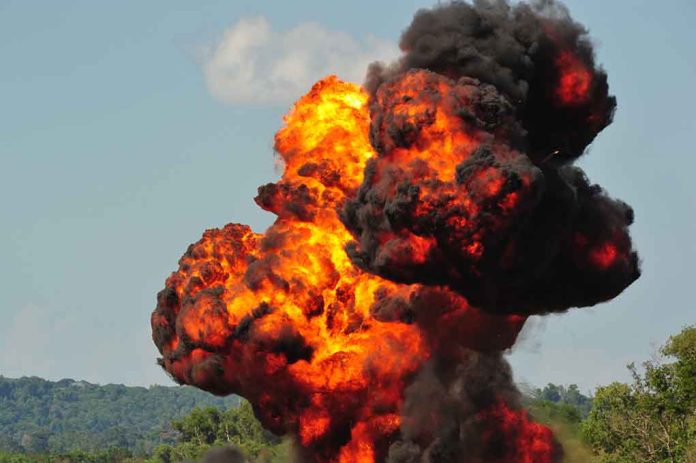
A devastating fuel tanker explosion in Nigeria claims 48 lives, prompting urgent calls for road safety reforms.
At a Glance
- A fuel tanker collided head-on with another truck in Nigeria’s Agaie area, causing a deadly explosion.
- At least 48 people were killed, including passengers and cattle being transported.
- The incident highlights Nigeria’s ongoing struggle with road safety and fuel transportation hazards.
- Calls for improved infrastructure and stricter regulations have intensified following the tragedy.
Tragic Collision Claims Dozens of Lives
A catastrophic explosion rocked Nigeria’s north-central Niger state when a fuel tanker collided head-on with another truck in the Agaie area. The collision resulted in the death of at least 48 individuals, marking one of the deadliest road accidents in recent Nigerian history. Abdullahi Baba-Arab, director-general of the Niger State Emergency Management Agency, confirmed the casualties and reported ongoing search and rescue operations.
The fuel tanker was also transporting cattle, with at least 50 animals burned alive in the inferno. Initially, 30 bodies were recovered from the scene, but as rescue efforts continued, an additional 18 victims were discovered. The scale of the tragedy necessitated a mass burial for the deceased, underscoring the devastating impact on the local community.
BREAKING: Fuel tanker collision in Nigeria caused an explosion that killed at least 48 people https://t.co/PVapc67l6P
— The Associated Press (@AP) September 8, 2024
Urgent Need for Road Safety Reforms
This latest incident has reignited discussions about the pressing need for road safety reforms in Nigeria. The country’s reliance on road transport for fuel distribution, coupled with inadequate infrastructure and lax enforcement of regulations, has created a dangerous environment for motorists and communities alike. In 2020 alone, Nigeria recorded 1,531 gasoline tanker crashes, resulting in 535 fatalities and 1,142 injuries, according to the Federal Road Safety Corps.
“always be cautious and abide by road traffic regulations to safeguard lives and property.” – Mohammed Bago, governor of Niger state
Governor Mohammed Bago of Niger state urged residents to remain calm in the wake of the tragedy. His call for adherence to traffic regulations highlights the critical role that both drivers and authorities play in preventing such catastrophes. However, many argue that systemic changes are necessary to address the root causes of these recurring accidents.
Fuel tanker collision in Nigeria caused an explosion that killed at least 48 people https://t.co/cHFFaMFO6n
— WRAL NEWS in NC (@WRAL) September 8, 2024
Infrastructure Challenges and Potential Solutions
One of the primary factors contributing to the frequency of fuel tanker accidents in Nigeria is the lack of an efficient railway system for cargo transport. This deficiency forces the country to rely heavily on road transportation for the distribution of fuel and other hazardous materials. Experts argue that investing in alternative transport infrastructure, such as a modern rail network, could significantly reduce the number of dangerous vehicles on Nigeria’s roads.
Additionally, stricter enforcement of existing regulations and the implementation of new safety measures are crucial steps in preventing future tragedies. This may include mandatory driver training programs, regular vehicle inspections, and the use of advanced safety technologies in fuel tankers. The government and transportation industry must work together to develop and implement these reforms promptly.
As Nigeria grapples with the aftermath of this tragic explosion, the incident serves as a stark reminder of the urgent need for comprehensive road safety reforms. By addressing infrastructure deficiencies, enhancing regulatory frameworks, and fostering a culture of safety among road users, the nation can work towards preventing such devastating loss of life in the future. The memory of the 48 lives lost in Agaie should serve as a catalyst for meaningful change in Nigeria’s approach to road safety and fuel transportation.
Sources:
- Fuel tanker collision in Nigeria caused an explosion that killed at least 48 people
- Fuel Tanker Collision in Nigeria Caused an Explosion That Killed at Least 48 People
- Fuel tanker collision in Nigeria caused an explosion that killed at least 48 people
- 48 killed in fuel tanker collision in Nigeria
- Fuel tanker collision in Nigeria caused an explosion that killed at least 48 people














